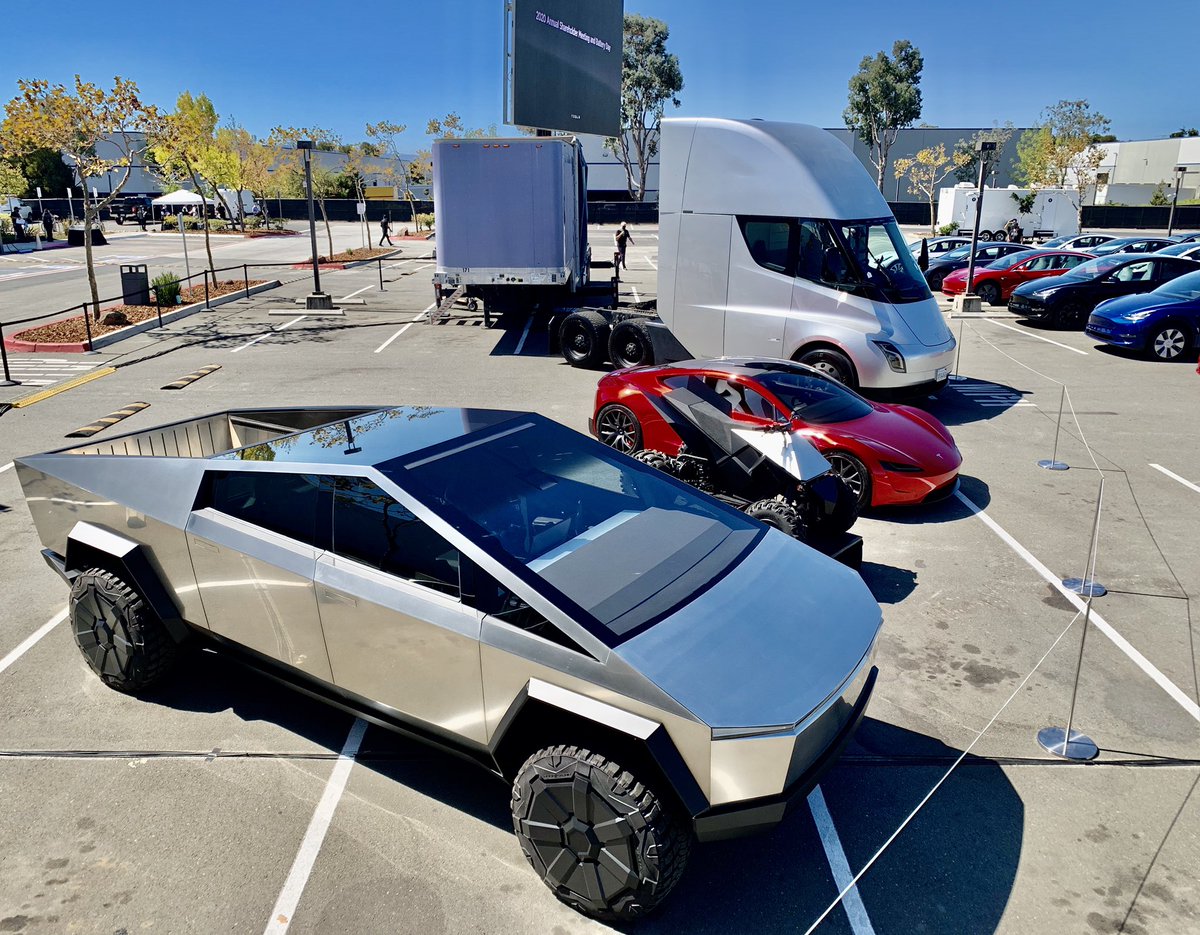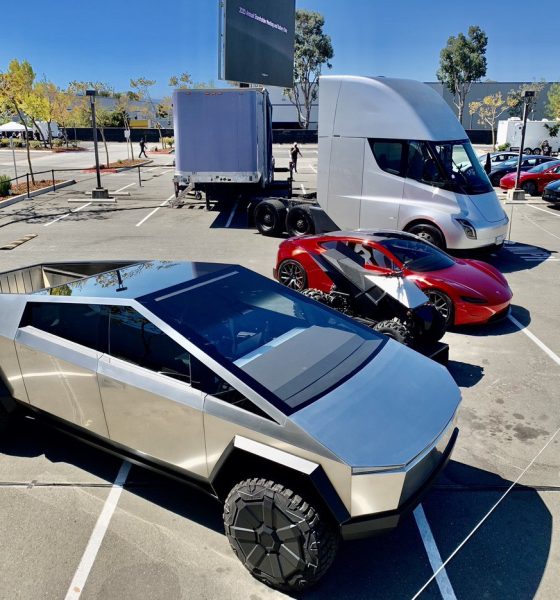

News
Tesla and GM’s EV tax credit may see resurgence under Biden presidency
Tesla and GM’s EV tax credits may be restored under a Joe Biden presidency, according to an analysis of the presidential candidate’s tax proposals by the Tax Policy Center (TPC). The authors of the analysis assumed that Biden might make EV tax credits permanent.
A Congressional Research Service (CRS) document states that consumers who purchase “qualifying plug-in electric vehicles (PHEVs)” may claim federal income tax credit of up to $7,500. The CRS works exclusively with the United States Congress and acts as the legislative body’s official library.
The CRS document adds that the aforementioned tax credit will be phased out once a vehicle manufacturer sells 200,000 PHEVs. Thus far, Tesla and GM are the two automakers that have reached the limit in tax credits.
A CleanTechnica article specifically brought attention to page seven of the TPC analysis. Listed in a section titled Individual Income Taxes under the section labeled Biden’s Tax Provisions, TPC wrote:
“Restore the full electric vehicle tax credit, target it to middle-income consumers, and prioritize the purchase of American-made vehicles. We assume the proposal makes the electric vehicle tax credit permanent, repeals the per manufacturer cap, and phases out the credit for taxpayers with income above $250,000.”
Biden’s official campaign page delves deeper into the presidential candidate’s plans for the auto industry in the United States. It states that Biden wants to “position the American auto industry to win the 21st century.” To accomplish the feat, Biden plans to use the power of the federal government to make the United States a global leader in EV manufacturing industry.
Biden’s website listed six specific goals the presidential hopeful plans to achieve to turn the American EV auto industry into a global leader, if he wins the presidency. Most notable of the six, specifically in relation to Tesla and GM, would be Biden’s plan to purchase clean vehicles for “federal, state, tribal, postal, and local fleets.” The presidential candidates hopes that by adding up to 3 million clean cars in these fleets, he can increase the demand for American-made, American-sourced green vehicles.
Out of all the American car manufacturers, Tesla and GM are probably the most well-positioned to execute and benefit from Biden’s plans. All of Tesla’s vehicles are BEVs and the automaker’s Gigafactories already perform within Biden’s goals for other car factories. With its Hummer EV and Chevy Bolt, GM has taken some steps toward the auto industry Biden wants to establish. Restoring GMs EV tax credit might encourage the legacy automaker to produce more clean vehicles and contribute to Biden’s fleet.
Tesla may practically be the only American automaker that is already performing within Biden’s plans for the future. Restoring its EV tax credits would only accelerate its success.
Read the TPC’s analysis of Joe Biden’s tax proposals in the document below.

Cybertruck
Tesla drops latest hint that new Cybertruck trim is selling like hotcakes
According to Tesla’s Online Design Studio, the new All-Wheel-Drive Cybertruck will now be delivered in April 2027. Earlier orders are still slated for early this Summer, but orders from here on forward are now officially pushed into next year:

Tesla’s new Cybertruck offering has had its delivery date pushed back once again. This is now the second time, and deliveries for the newest orders are now pushed well into 2027.
According to Tesla’s Online Design Studio, the new All-Wheel-Drive Cybertruck will now be delivered in April 2027. Earlier orders are still slated for early this Summer, but orders from here on forward are now officially pushed into next year:
🚨 Tesla has updated the $59,990 Cybertruck Dual Motor AWD’s estimated delivery date to April 2027.
First deliveries are still slated for June, but if you order it now, you’ll be waiting over a year.
Demand appears to be off the charts for the new Cybertruck and consumers are… pic.twitter.com/raDCCeC0zP
— TESLARATI (@Teslarati) February 26, 2026
Just three days ago, the initial delivery date of June 2026 was pushed back to early Fall, and now, that date has officially moved to April 2027.
The fact that Tesla has had to push back deliveries once again proves one of two things: either Tesla has slow production plans for the new Cybertruck trim, or demand is off the charts.
Judging by how Tesla is already planning to raise the price based on demand in just a few days, it seems like the company knows it is giving a tremendous deal on this spec of Cybertruck, and units are moving quickly.
That points more toward demand and not necessarily to slower production plans, but it is not confirmed.
Tesla Cybertruck’s newest trim will undergo massive change in ten days, Musk says
Tesla is set to hike the price on March 1, so tomorrow will be the final day to grab the new Cybertruck trim for just $59,990.
It features:
- Dual Motor AWD w/ est. 325 mi of range
- Powered tonneau cover
- Bed outlets (2x 120V + 1x 240V) & Powershare capability
- Coil springs w/ adaptive damping
- Heated first-row seats w/ textile material that is easy to clean
- Steer-by-wire & Four Wheel Steering
- 6’ x 4’ composite bed
- Towing capacity of up to 7,500 lbs
- Powered frunk
Interestingly, the price offering is fairly close to what Tesla unveiled back in late 2019.
Elon Musk
Elon Musk outlines plan for first Starship tower catch attempt
Musk confirmed that Starship V3 Ship 1 (SN1) is headed for ground tests and expressed strong confidence in the updated vehicle design.

Elon Musk has clarified when SpaceX will first attempt to catch Starship’s upper stage with its launch tower. The CEO’s update provides the clearest teaser yet for the spacecraft’s recovery roadmap.
Musk shared the details in recent posts on X. In his initial post, Musk confirmed that Starship V3 Ship 1 (SN1) is headed for ground tests and expressed strong confidence in the updated vehicle design.
“Starship V3 SN1 headed for ground tests. I am highly confident that the V3 design will achieve full reusability,” Musk wrote.
In a follow-up post, Musk addressed when SpaceX would attempt to catch the upper stage using the launch tower’s robotic arms.
“Should note that SpaceX will only try to catch the ship with the tower after two perfect soft landings in the ocean. The risk of the ship breaking up over land needs to be very low,” Musk clarified.
His remarks suggest that SpaceX is deliberately reducing risk before attempting a tower catch of Starship’s upper stage. Such a milestone would mark a major step towards the full reuse of the Starship system.
SpaceX is currently targeting the first Starship V3 flight of 2026 this coming March. The spacecraft’s V3 iteration is widely viewed as a key milestone in SpaceX’s long-term strategy to make Starship fully reusable.
Starship V3 features a number of key upgrades over its previous iterations. The vehicle is equipped with SpaceX’s Raptor V3 engines, which are designed to deliver significantly higher thrust than earlier versions while reducing cost and weight.
The V3 design is also expected to be optimized for manufacturability, a critical step if SpaceX intends to scale the spacecraft’s production toward frequent launches for Starlink, lunar missions, and eventually Mars.
News
Tesla FSD (Supervised) could be approved in the Netherlands next month: Musk
Musk shared the update during a recent interview at Giga Berlin.

Tesla CEO Elon Musk shared that Full Self-Driving (FSD) could receive regulatory approval in the Netherlands as soon as March 20, potentially marking a major step forward for Tesla’s advanced driver-assistance rollout in Europe.
Musk shared the update during a recent interview at Giga Berlin, noting that the date was provided by local authorities.
“Tesla has the most advanced real-world AI, and hopefully, it will be approved soon in Europe. We’re told by the authorities that March 20th, it’ll be approved in the Netherlands,’ what I was told,” Musk stated.
“Hopefully, that date remains the same. But I think people in Europe are going to be pretty blown away by how good the Tesla car AI is in being able to drive.”
Tesla’s FSD system relies on vision-based neural networks trained on real-world driving data, allowing vehicles to navigate using cameras and AI rather than traditional sensor-heavy solutions.
The performance of FSD Supervised has so far been impressive. As per Tesla’s safety report, Full Self-Driving Supervised has already traveled 8.3 billion miles. So far, vehicles operating with FSD Supervised engaged recorded one major collision every 5,300,676 miles.
In comparison, Teslas driven manually with Active Safety systems recorded one major collision every 2,175,763 miles, while Teslas driven manually without Active Safety recorded one major collision every 855,132 miles. The U.S. average during the same period was one major collision every 660,164 miles.
If approval is granted on March 20, the Netherlands could become the first European market to greenlight Tesla’s latest supervised FSD (Supervised) software under updated regulatory frameworks. Tesla has been working to secure expanded FSD access across Europe, where regulatory standards differ significantly from those in the United States. Approval in the Netherlands would likely serve as a foundation for broader EU adoption, though additional country-level clearances may still be required.








